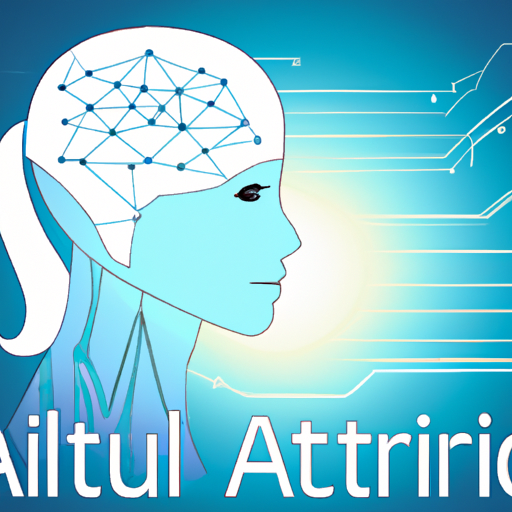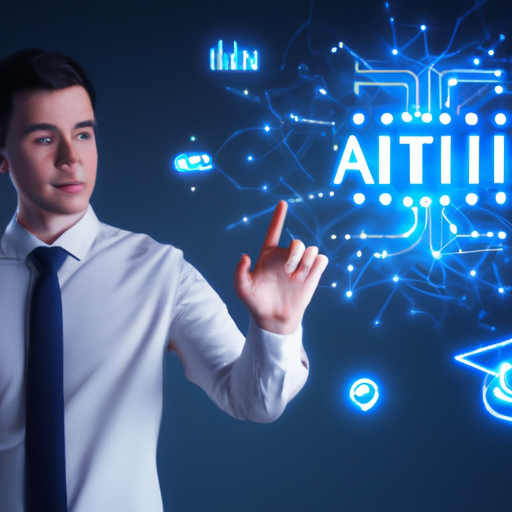-
Table of Contents
- Introduction
- The Challenges of Regulating Artificial Intelligence
- The Ethical Implications of Autonomous Weapons Systems
- The Potential for Artificial Intelligence to Disrupt Labor Markets
- The Role of Artificial Intelligence in Social Inequality
- The Impact of Artificial Intelligence on Human Rights
- Conclusion
“Unlock the Potential of AI – Explore the Ethical and Societal Implications Today!”
Introduction
The ethical and societal implications of artificial intelligence (AI) are becoming increasingly important as AI technology advances. AI has the potential to revolutionize many aspects of our lives, from healthcare to transportation, and its implications for society are far-reaching. AI can be used to automate processes, improve decision-making, and even replace human labor in some cases. However, with these advances come ethical and societal implications that must be considered. These implications include issues such as privacy, safety, and the potential for AI to be used for malicious purposes. Additionally, AI can have a significant impact on the labor market, as well as on the way we interact with each other and with technology. It is important to consider the ethical and societal implications of AI in order to ensure that its use is beneficial to society as a whole.
The Challenges of Regulating Artificial Intelligence
The development of artificial intelligence (AI) has been a major breakthrough in the field of technology, and its potential applications are vast. However, the rapid advancement of AI has also raised a number of challenges in terms of its regulation.
One of the primary challenges of regulating AI is the difficulty of defining it. AI is a broad term that encompasses a wide range of technologies, from simple algorithms to complex systems that can learn and adapt. This makes it difficult to create a single set of regulations that can be applied to all AI systems.
Another challenge is the potential for AI systems to be used for malicious purposes. AI systems can be used to automate malicious activities such as cyberattacks, and it can be difficult to detect and prevent these activities. Additionally, AI systems can be used to manipulate data or create false information, which can be difficult to detect and regulate.
Finally, the ethical implications of AI are another challenge in terms of regulation. AI systems can be used to make decisions that have ethical implications, such as decisions about healthcare or criminal justice. It can be difficult to create regulations that ensure that AI systems are making ethical decisions.
Overall, the development of AI has created a number of challenges in terms of its regulation. These challenges include the difficulty of defining AI, the potential for malicious use, and the ethical implications of AI systems. As AI continues to develop, it is important to create regulations that can address these challenges and ensure that AI is used responsibly.
The Ethical Implications of Autonomous Weapons Systems
Autonomous weapons systems (AWS) are a rapidly developing technology that has the potential to revolutionize warfare. However, the ethical implications of this technology are far-reaching and complex. This article will explore the ethical implications of AWS and the potential consequences of their use.
First, it is important to understand what AWS are and how they differ from traditional weapons systems. AWS are weapons systems that are capable of making decisions and taking action without direct human input. This means that they can identify targets, select weapons, and launch attacks without any human intervention. This has the potential to greatly reduce the risk of human error and increase the speed and accuracy of military operations.
However, the use of AWS also raises a number of ethical concerns. One of the most pressing is the potential for AWS to be used to commit war crimes. Without direct human oversight, it is possible for AWS to make decisions that violate international laws and conventions. This could lead to the indiscriminate killing of civilians or other war crimes.
Another ethical concern is the potential for AWS to be used to commit acts of aggression. Without direct human oversight, it is possible for AWS to be used to launch attacks without any provocation or justification. This could lead to an escalation of conflict and potentially cause more harm than good.
Finally, there is the potential for AWS to be used to commit acts of terrorism. Without direct human oversight, it is possible for AWS to be used to launch attacks against civilian targets with the intent to cause fear and panic. This could lead to a breakdown of civil order and potentially cause more harm than good.
In conclusion, the ethical implications of AWS are far-reaching and complex. While the potential benefits of this technology are undeniable, the potential risks must also be taken into consideration. It is essential that any decision to use AWS is made with full consideration of the potential consequences.
The Potential for Artificial Intelligence to Disrupt Labor Markets
The potential for artificial intelligence (AI) to disrupt labor markets is a topic of increasing interest and concern. AI is a rapidly developing technology that has the potential to automate many of the tasks currently performed by humans. This could have a significant impact on labor markets, as AI-driven automation could reduce the need for human labor in many industries.
AI is already being used in a variety of ways to automate tasks and processes. For example, AI-driven automation is being used in manufacturing to automate production lines, in customer service to provide automated responses to customer inquiries, and in finance to automate financial transactions. AI is also being used to automate more complex tasks, such as medical diagnosis and legal research.
The potential for AI to disrupt labor markets is twofold. First, AI-driven automation could reduce the need for human labor in many industries. This could lead to job losses in those industries, as well as a decrease in wages for those who remain employed. Second, AI-driven automation could lead to the emergence of new jobs that require different skills than those currently in demand. This could lead to a shift in the types of jobs available, as well as a shift in the skills required to perform those jobs.
The potential for AI to disrupt labor markets is a cause for concern, as it could lead to job losses and a decrease in wages for those who remain employed. However, it is important to note that AI-driven automation could also lead to the emergence of new jobs and new opportunities for those with the right skills. As such, it is important for governments and businesses to consider the potential impacts of AI-driven automation on labor markets and to develop strategies to ensure that the benefits of AI-driven automation are shared equitably.
The Role of Artificial Intelligence in Social Inequality
The role of artificial intelligence (AI) in social inequality is a complex and multifaceted issue. AI has the potential to both exacerbate existing inequalities and create new ones, as well as to reduce them.
On the one hand, AI can be used to automate processes and create efficiencies that can reduce inequality. For example, AI can be used to automate mundane tasks, freeing up people to pursue more meaningful work. AI can also be used to identify and address systemic biases in decision-making, such as those related to race, gender, and class.
On the other hand, AI can also be used to create new forms of inequality. AI algorithms can be biased, leading to decisions that are unfair or discriminatory. AI can also be used to automate processes that are inherently biased, such as facial recognition systems that are more likely to misidentify people of color.
Finally, AI can be used to exacerbate existing inequalities. For example, AI can be used to automate processes that are already biased, such as job applications that are more likely to favor certain demographics. AI can also be used to target certain populations with advertising or other services, creating a digital divide between those who have access to AI-driven services and those who do not.
In conclusion, AI has the potential to both reduce and create social inequality. It is important for policymakers and technology companies to be aware of the potential implications of AI and to take steps to ensure that AI is used responsibly and ethically.
The Impact of Artificial Intelligence on Human Rights
The emergence of artificial intelligence (AI) has had a profound impact on human rights. AI is a form of technology that enables machines to perform tasks that would normally require human intelligence, such as decision-making, problem-solving, and learning. AI has the potential to revolutionize the way we live, work, and interact with one another. However, it also has the potential to infringe upon our fundamental human rights.
AI has the potential to be used to monitor and control individuals, as well as to discriminate against certain groups of people. For example, AI-powered facial recognition technology can be used to track people’s movements and activities, and to identify them without their consent. This technology can be used to target certain groups of people, such as racial or religious minorities, and can lead to violations of their right to privacy.
AI can also be used to manipulate public opinion and to spread false information. AI-powered algorithms can be used to target individuals with specific messages, and to influence their opinions and behavior. This can lead to a violation of the right to freedom of expression, as well as the right to access accurate information.
Finally, AI can be used to automate certain processes, such as hiring and firing decisions. This can lead to discrimination against certain groups of people, such as women and minorities, as AI algorithms may be biased against them. This can lead to a violation of the right to equal treatment under the law.
In order to ensure that AI is used in a way that respects human rights, it is important that governments and companies take steps to ensure that AI is developed and used responsibly. This includes developing ethical guidelines for the use of AI, as well as ensuring that AI algorithms are tested for bias and accuracy. It is also important to ensure that individuals have the right to access and challenge the decisions made by AI algorithms.
In conclusion, AI has the potential to revolutionize the way we live, work, and interact with one another. However, it also has the potential to infringe upon our fundamental human rights. In order to ensure that AI is used in a way that respects human rights, it is important that governments and companies take steps to ensure that AI is developed and used responsibly.
Conclusion
The ethical and societal implications of artificial intelligence are far-reaching and complex. AI has the potential to revolutionize the way we live, work, and interact with each other, but it also carries with it a number of ethical and societal implications that must be addressed. AI can be used to automate processes, reduce bias, and improve decision-making, but it can also be used to manipulate and exploit people. It is important to consider the ethical and societal implications of AI before implementing it, and to ensure that it is used responsibly and ethically.



